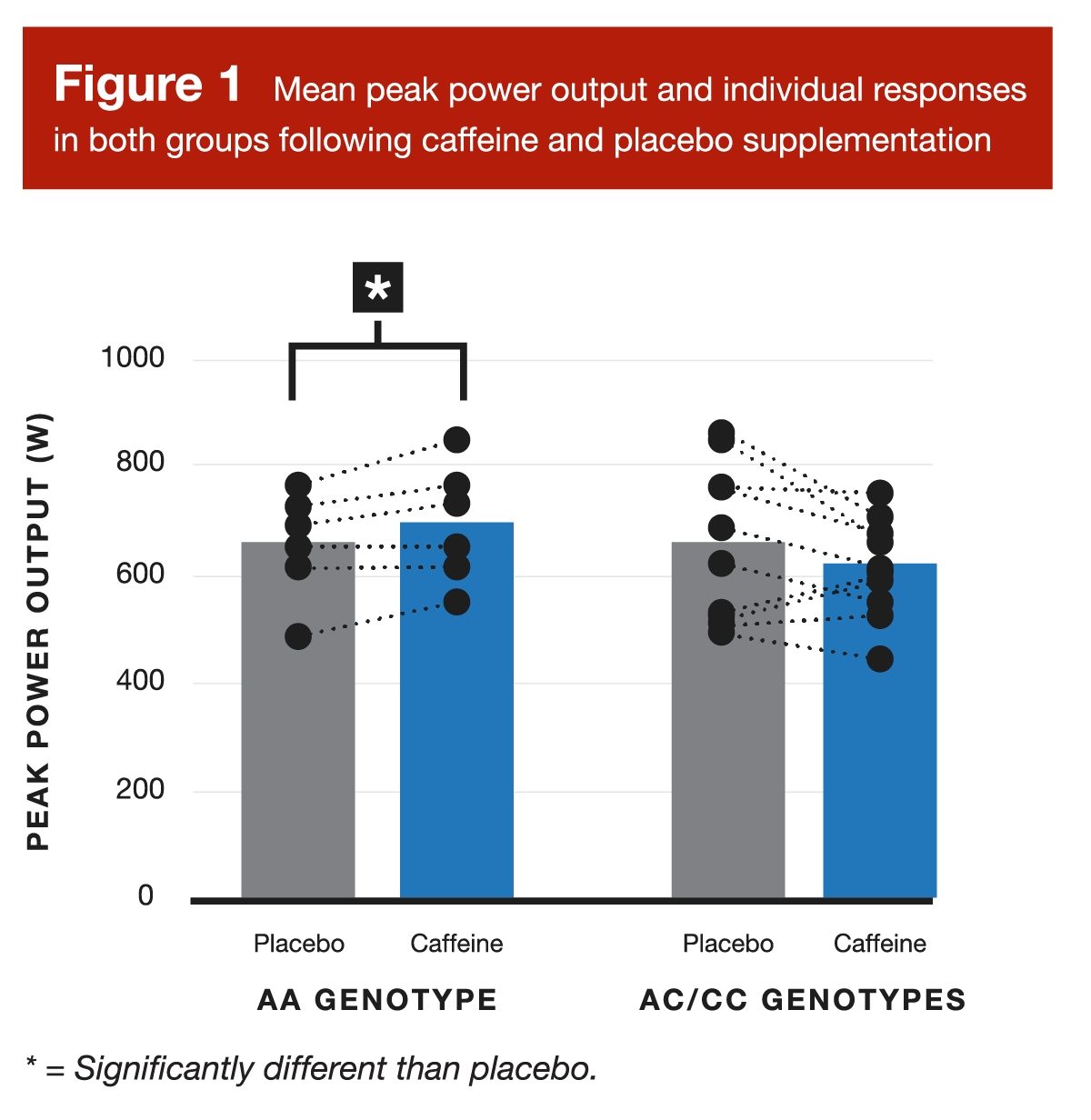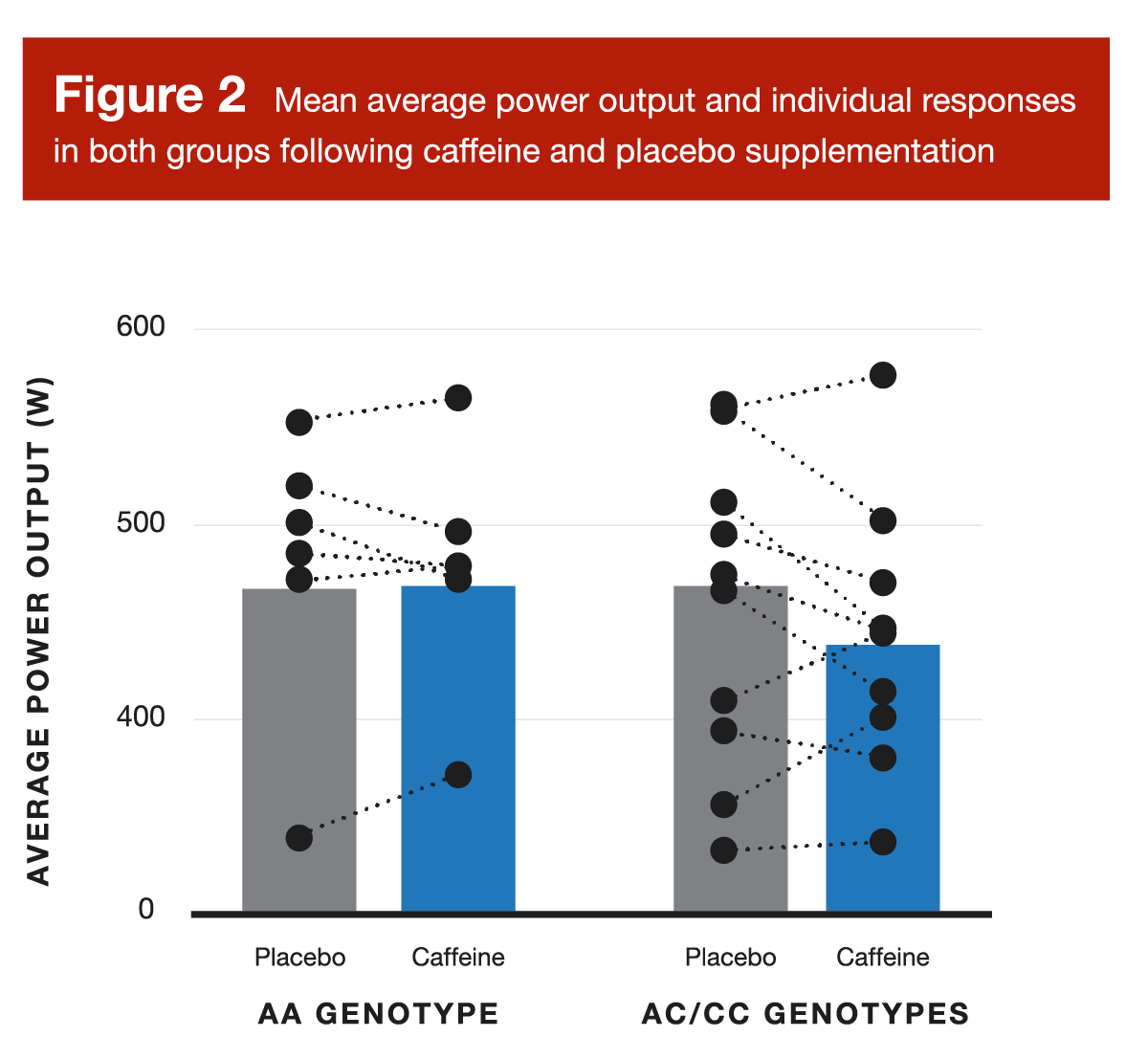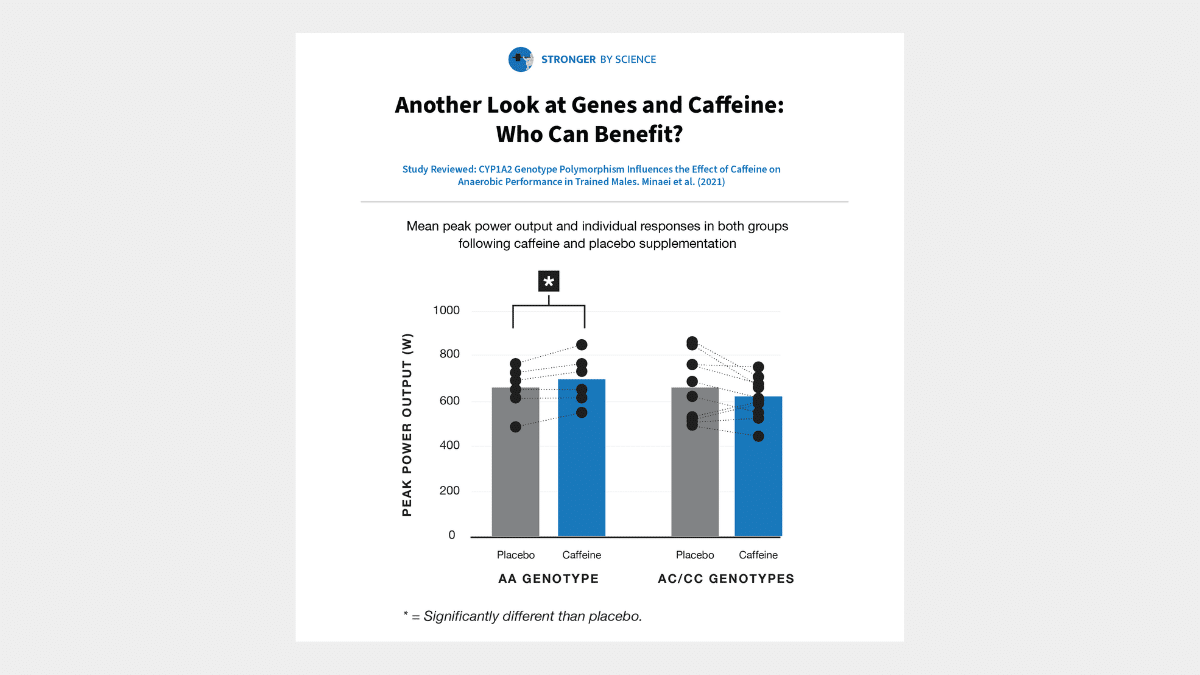Caffeine is one of the more effective supplements on the market for strength, physique, and endurance athletes alike, it has beneficial effects on wakefulness and alertness that extend outside of physical performance, and it’s found in a wide range of common foods and beverages. We know that caffeine acutely enhances performance, and chronic caffeine users can still enjoy performance benefits, although habituation may influence the magnitude of caffeine’s ergogenic effects to some degree. However, two topics remain unresolved: we’re still not entirely certain if caffeine meaningfully improves longitudinal training adaptations, and we’re still not entirely certain if an individual’s genotype meaningfully alters the performance-boosting effects of caffeine supplementation.
The CYP1A2 gene codes for the key enzyme that dictates the rate of caffeine metabolism, whereas the ADORA2A gene codes for a key receptor responsible for caffeine’s ergogenic effects. The presently reviewed study focused on the former gene (CYP1A2), and sought to determine if caffeine had differential effects on performance for “fast metabolizers” (individuals with two copies of the “A” allele, thus having the AA genotype) and “slow metabolizers” (individuals with at least one copy of the “C” allele, thus having the AC or CC genotype). 16 resistance-trained men (age: 21.6 ± 7.1 years; height: 179.7 ± 5.6 cm; body mass: 72.15 ± 6.8 kg; habitual caffeine intake: < 100mg/day) completed this study. 6 participants were “fast metabolizers” (AA genotype), and 10 participants were “slow metabolizers” (AC or CC genotype). It was a placebo-controlled, crossover study consisting of two testing visits separated by a one-week washout period. At one visit, they consumed 6mg/kg of caffeine 60 minutes prior to exercise testing, while they consumed placebo capsules at the other visit. Performance was assessed using a single Wingate test, which is a 30-second maximal sprint on a cycle ergometer with an added resistance of 7.5% of body mass. Outcomes of interest included peak power, mean power, minimum power, and fatigue index (the relative drop from peak power to minimum power, expressed as a percentage).
As shown in Figure 1, there was a significant group × treatment interaction effect for peak power (p = 0.041); caffeine significantly increased peak power in fast metabolizers (p = 0.039), but led to a nonsignificant reduction in slow metabolizers (p = 0.135). However, as shown in Figure 2, the group × treatment interaction effect for average power was not statistically significant (p = 0.473), and caffeine wasn’t particularly helpful for either genotype group. Along those lines, significant group × treatment interaction effects were not observed for minimum power (p = 0.839) or fatigue index (p = 0.239). The researchers concluded that the results “partially” supported their hypothesis, given that caffeine improved peak performance in a genotype-specific manner, while the other outcomes were unaffected by genotype.


Given the relatively mixed findings and the very small sample size (only six fast metabolizers), in addition to the somewhat fickle nature of peak power measurements, it’s hard to view these results as unequivocal proof that caffeine is only ergogenic for fast metabolizers. While the peak power results lean toward that conclusion, the broader literature on this topic paints a much more ambiguous picture. Without question, there are other studies suggesting that fast metabolizers enjoy more pronounced ergogenic effects from caffeine than slow metabolizers. For instance, the first study (to my knowledge) investigating the relationship between CYP1A2 genotype and performance effects of caffeine found that fast metabolizers improved time trial by 4.9% after caffeine supplementation, which was a significantly larger improvement than was observed in slow metabolizers (1.8%). More recently, Wong et al reported less favorable strength results for slower metabolizers, but it wasn’t because the faster metabolizers had exceptional responses to caffeine. Rather, subjects with AA and AC genotypes enjoyed no significant performance benefit, while 4mg/kg of caffeine actually reduced handgrip strength by 12.8% in individuals with the CC genotype.
In fact, as reviewed in a recent position stand by the International Society of Sports Nutrition, there are quite a few examples of studies in which people with AC or CC genotypes exhibited less pronounced ergogenic effects (or even ergolytic effects) when compared to people with AA genotypes. Nonetheless, counterexamples in which CYP1A2 genotype did not appear to significantly influence the ergogenic impact of caffeine are plentiful. The most recent systematic review directly addressing this topic reported that only 2 out of 11 studies fitting the inclusion criteria found that CYP1A2 genotype significantly impacted caffeine’s effect on aerobic performance outcomes. Both studies reporting a significant impact found an impairment of ergogenic effects in slower metabolizers (people with AC or CC genotypes), and both used fairly long duration exercise tasks (10-40km cycling time trials). Of the 8 studies looking at “high-intensity” exercise (strength, power, and sprint tests), 2 of them found that CYP1A2 genotype significantly impacted the ergogenic effect of caffeine (with results once again suggesting more favorable caffeine responses in faster metabolizers). However, the size of the difference was pretty small in one of the studies (one extra rep per set during resistance training), and the other study measured eight performance outcomes, and only found a significant impact of CYP1A2 genotype for 1 of the 8 outcomes.
In light of fairly mixed and equivocal evidence, the most straightforward way to address this topic might involve reframing the question. You might be wondering if the magnitude of caffeine’s ergogenic effect differs among CYP1A2 genotypes, but that’s not the most useful or actionable question. You accepted your CYP1A2 genotype at birth, and that’s pretty much locked in at this point. A more pragmatic question is whether or not slow metabolizers can still obtain an ergogenic effect of some magnitude from acute caffeine supplementation. The systematic review by Grgic et al displays effect sizes for fast and slow metabolizers across a wide range of studies, and there are simply too many instances of slow metabolizers enjoying ergogenic effects for me to believe that inheriting the AC or CC genotype automatically makes you a nonresponder to caffeine.
So, my tentative conclusions are as follows: 1) it’s possible that fast metabolizers (AA) might have slightly greater ergogenic effects from caffeine than slow metabolizers (AC or CC), but studies report differences that tend to be small and inconsistent; 2) genotype differences might become more pronounced during long-duration aerobic activity and when the ingested caffeine dose is particularly high (≥ 6 mg/kg); 3) there is plenty of evidence to suggest that slow metabolizers can still enjoy ergogenic effects for a variety of exercise outcomes with caffeine doses between 2-6mg/kg.
This Research Spotlight was originally published in MASS Research Review. Subscribe to MASS to get a monthly publication with breakdowns of recent exercise and nutrition studies.
Credit: Graphics by Kat Whitfield.




